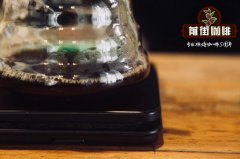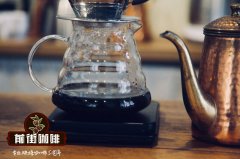Brazilian Coffee Donna Coffee Manor.

Professional coffee knowledge exchange more coffee bean information please follow the coffee workshop (Wechat official account cafe_style)
The owner of Fazenda Dona ne é m is Eduardo Pinheiro Campos. His family has been growing coffee in Sul de Minas for a long time. After inheriting his father's farmland, Eduardo named the estate after his mother's name Dona. The farm, which opened in 1977, is the earliest coffee garden near Patos de Minasto. Eduardo realized the importance of environmental protection a long time ago, although the concept of certification had not yet been introduced into Brazil at that time, he thought: "Nature is always the first priority!" "the conservation work of the estate far exceeds Brazil's environmental regulations, replanting native trees and shrubs, and the farm retains about 450 acres of beautiful Cerrado woodland.
In addition to coffee, farms grow other food crops and raise cattle. In order to respond to the environmental impact caused by animal husbandry, facilities to protect clean water sources were built along the river bank to effectively conserve the nature and rich vegetation of the Hirado area. Its own nursery can replant 10% of the coffee trees every year. Eduardo now operates two estates, as well as S ã o Jo ã o Grande, where only 228 hectares of coffee are actually grown, with an average altitude of about 1050m. Donna is a completely high-tech farm. Harvesting is assisted by manpower and machines. The harvester can identify fully ripe coffee cherries.
The electronic screening machine can identify the defects of raw beans that can not be seen by human eyes, automatically measure the size and density, and screen quickly. After the drying process, the fully automated dryer runs 24 hours a day to detect moisture content at any time. In the end, it produced coffee of extremely stable quality, which won many awards in the international community. This coffee is treated with Pulped Natural, which is commonly used on exquisite farms. After the peel and pulp of ripe coffee cherries are removed, part of the pulp mucus is retained on the outside of the fruit and dried. Excellent fruit drying process can produce clean, mild acidity and unique sweetness.
Important Notice :
前街咖啡 FrontStreet Coffee has moved to new addredd:
FrontStreet Coffee Address: 315,Donghua East Road,GuangZhou
Tel:020 38364473
- Prev

Brazilian Coffee Minas Coffee Manor.
Professional coffee knowledge exchange more coffee bean information please follow the coffee workshop (Wechat official account cafe_style) Brazil is the world's largest coffee producer accounts for about 33% of coffee production, but because Brazil is located in the tropical rain forest, the terrain is flatter and less high-altitude mountain forests, most coffee is grown in low-altitude non-volcanic soil, and there is not much shade as shade.
- Next

Nicaraguan Coffee Nicaragua Storm Manor. The characteristics of Nicaraguan coffee.
Professional coffee knowledge exchange more coffee bean information please follow the coffee workshop (Wechat official account cafe_style) Nicaragua is known as the "country of mountains and lakes", coffee is mainly produced in the north-central mountains, with tropical forests and fern, orchid and lichen composition, colorful vegetation. The history of Nepal is full of conquest, resistance, war, dictatorship and corruption.
Related
- Does Rose Summer choose Blue, Green or Red? Detailed explanation of Rose Summer Coffee plots and Classification in Panamanian Jade Manor
- What is the difference between the origin, producing area, processing plant, cooperative and manor of coffee beans?
- How fine does the espresso powder fit? how to grind the espresso?
- Sca coffee roasting degree color card coffee roasting degree 8 roasting color values what do you mean?
- The practice of lattes: how to make lattes at home
- Introduction to Indonesian Fine Coffee beans-- Java Coffee producing area of Indonesian Arabica Coffee
- How much will the flavor of light and medium roasted rose summer be expressed? What baking level is rose summer suitable for?
- Introduction to the characteristics of washing, sun-drying or wet-planing coffee commonly used in Mantenin, Indonesia
- Price characteristics of Arabica Coffee Bean Starbucks introduction to Manning Coffee Bean Taste producing area Variety Manor
- What is the authentic Yega flavor? What are the flavor characteristics of the really excellent Yejasuffi coffee beans?

